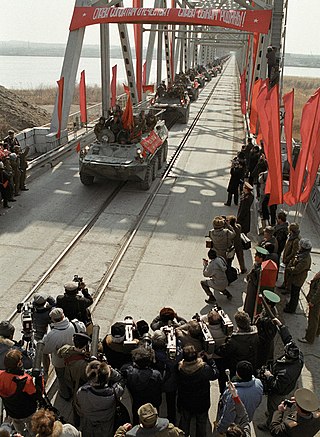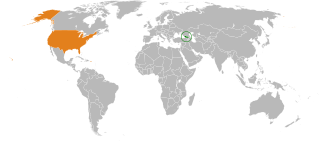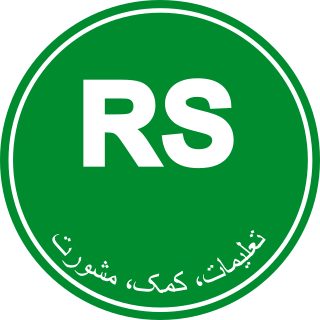Afghanistan withdrawal may refer to:
For earlier invasions and withdrawals from Afghanistan, see Invasions of Afghanistan
Afghanistan withdrawal may refer to:
For earlier invasions and withdrawals from Afghanistan, see Invasions of Afghanistan

Mohammad Najibullah Ahmadzai, commonly known as Dr. Najib, was an Afghan politician who served as the General Secretary of the People's Democratic Party of Afghanistan, the leader of the one-party ruling Democratic Republic of Afghanistan from 1986 to 1992 and as well as the President of Afghanistan from 1987 until his resignation in April 1992, shortly after which the mujahideen took over Kabul. After a failed attempt to flee to India, Najibullah remained in Kabul. He lived in the United Nations headquarters until his assassination by the Taliban after their capture of the city.

The Soviet–Afghan War (1979–1989) was a nine-year guerrilla war fought by insurgent groups known collectively as the Mujahideen, as well as smaller Maoist groups, against the military occupation of Afghanistan by the Soviet Union and their satellite state, the Democratic Republic of Afghanistan (DRA). The conflict lasted throughout the 1980s and fighting took place mostly in the Afghan countryside.
The following lists events that happened during 1986 in Afghanistan.

The withdrawal of the United States troops from Iraq began in December 2007 with the end of the Iraq War troop surge of 2007 and was mostly completed by December 2011, bringing an end to the Iraq War. The number of U.S. military forces in Iraq peaked at 170,300 in November 2007.

The proposed invasion of Afghanistan prompted protests with mass demonstrations in the days leading up to the official launch of the war on October 7, 2001. The continuation of the war in Afghanistan from 2001 to 2021 lead to further protest and opposition to hostilities.
The Geneva Accords, known formally as the agreements on the settlement of the situation relating to Afghanistan, were signed on 14 April 1988 at the Geneva headquarters of the United Nations, between Afghanistan and Pakistan, with the United States and the Soviet Union serving as guarantors.
Opposition to the War in Afghanistan (2001–2021) stemmed from numerous factors, including the view that the United States invasion of Afghanistan was illegal under international law and constituted an unjustified aggression, the view that the continued military presence constituted a foreign military occupation, the view that the war did little to prevent terrorism but increased its likelihood, and views on the involvement of geo-political and corporate interests. Also giving rise to opposition to the war were civilian casualties, the cost to taxpayers, and the length of the war to date.

The Multi-National Force – Iraq (MNF–I), often referred to as the Coalition forces, was a military command during the 2003 invasion of Iraq and much of the ensuing Iraq War, led by the United States of America, United Kingdom, Australia, Italy, Spain and Poland, responsible for conducting and handling military operations.

Relations between Afghanistan and the United States began in 1921 under the leaderships of Amanullah Khan and Warren G. Harding, respectively. The first contact between the two nations occurred further back in the 1830s when the first recorded person from the United States explored Afghanistan. The United States government foreign aid program provided about $500 million in aid for economic development; the aid ended before the 1978 Saur Revolution. The Soviet invasion starting in December 1979 was a turning point in the Cold War, when the United States started to financially support the Afghan resistance. The country, under both the Carter and Reagan administrations committed $3 billion dollars in financial and diplomatic support to the anti-Soviet Mujahideen forces. Beginning in 1980, the United States began admitting thousands of Afghan refugees for resettlement, and provided money and weapons to the Mujahideen through Pakistan's Inter-Services Intelligence (ISI). The USSR withdrew its troops in 1989.

Operation Cyclone was the code name for the United States Central Intelligence Agency (CIA) program to arm and finance the Afghan mujahideen in Afghanistan from 1979 to 1992, prior to and during the military intervention by the USSR in support of the Democratic Republic of Afghanistan. The mujahideen were also supported by Britain's MI6, who conducted their own separate covert actions. The program leaned heavily towards supporting militant Islamic groups, including groups with jihadist ties, that were favored by the regime of Muhammad Zia-ul-Haq in neighboring Pakistan, rather than other, less ideological Afghan resistance groups that had also been fighting the Soviet-oriented Democratic Republic of Afghanistan administration since before the Soviet intervention.

The final and complete withdrawal of Soviet combatant forces from Afghanistan began on 15 May 1988 and ended on 15 February 1989 under the leadership of Colonel-General Boris Gromov.

Relations between the countries of Georgia and the United States continue to be very close and encompass multiple areas of bilateral cooperation. One of the key U.S. allies in Eastern Europe, Georgia was the third largest troop contributor in the Iraq War and the largest per-capita contributor to the U.S. led mission in Afghanistan. The United States for its part is actively assisting Georgia in strengthening its state institutions in face of increasing pressure from its northern neighbor Russia and has provided the country with financial assistance in excess of 3 billion dollars since 1991. Since 2009, Georgian–American relations are streamlined by the U.S.–Georgia Charter on Strategic Partnership, which created four bilateral working groups on priority areas of democracy; defense and security; economic, trade, energy issues, people-to-people and cultural exchanges.

The War in Afghanistan was an armed conflict that began when an international military coalition led by the United States launched an invasion of Afghanistan, toppling the Taliban-ruled Islamic Emirate and establishing the internationally recognized Islamic Republic three years later. The conflict ultimately ended with the 2021 Taliban offensive, which overthrew the Islamic Republic, and re-established the Islamic Emirate. It was the longest war in the military history of the United States, surpassing the length of the Vietnam War (1955–1975) by approximately six months.
A 47-nation global survey of public opinion conducted in June 2007 by the Pew Global Attitudes Project found considerable opposition to the NATO military operations in Afghanistan. In 2 out of the 47 countries was there a majority that favoured keeping troops in Afghanistan – Israel (59%) and Kenya (60%). On the other hand, in 41 of the 47 countries pluralities wanted NATO troops out of Afghanistan as soon as possible. In 32 out of 47 countries majorities wanted NATO troops out of Afghanistan as soon as possible. Majorities in 7 out of 12 NATO member countries wanted troops withdrawn as soon as possible.

The Afghanistan conflict is a series of events and wars that have kept Afghanistan in a continuous state of armed conflict since 1978. The country's instability began during the time of the Republic of Afghanistan in the 1970s, which had been established following the collapse of the Kingdom of Afghanistan in the 1973 coup d'état; with the overthrow of Afghan monarch Mohammed Zahir Shah, who reigned for almost forty years, Afghanistan’s relatively peaceful period in modern history came to an end. The triggering event for the ongoing Afghanistan conflict was the Saur Revolution of 1978, which overthrew the Republic of Afghanistan and established the Democratic Republic of Afghanistan. Rampant post-revolution fighting across the country ultimately led to a pro-government military intervention by the Soviet Union, sparking the Soviet–Afghan War in the 1980s.

The withdrawal of United States troops from Afghanistan describes the drawdown of United States Armed Forces in the Afghanistan war and the plans after its post-2014 presence when most combat troops had left Afghanistan at the end of 2014.

Resolute Support Mission (RSM) or Operation Resolute Support was a NATO-led multinational mission in Afghanistan. It began on 1 January 2015 as the successor to the International Security Assistance Force (ISAF), which was completed on 28 December 2014. Pursuant to United Nations Security Council Resolution 2189 of 2014, RSM was a noncombat mission aimed at advising and training Afghan security forces to provide long-term security to the country, under the aegis of the Security and Defence Cooperation Agreement BSA between the United States and Afghanistan, which was originally supposed to run from 1 January 2015 and "shall remain in force until the end of 2024 and beyond" unless terminated with two years' advance notice.

The United States Armed Forces completed their withdrawal from Afghanistan on 30 August 2021, marking the end of the 2001–2021 war. In February 2020, the Trump administration and the Taliban, without the participation of the then Afghan government, signed the US–Taliban deal in Doha, Qatar, which stipulated fighting restrictions for both the US and the Taliban, and provided for the withdrawal of all NATO forces from Afghanistan in return for the Taliban's counter-terrorism commitments. The Trump administration's US–Taliban deal, and then the Biden administration’s decision in April 2021 to pull out all US troops by September 2021 without leaving a residual force, were the two critical events that caused the collapse of the Afghan National Security Forces (ANSF). Following the deal, the US dramatically reduced the number of air attacks and deprived the ANSF of a critical edge in fighting the Taliban insurgency, leading to the Taliban takeover of Kabul on 15 August 2021.
The United States has conducted two withdrawals of United States troops from Afghanistan:

The Agreement for Bringing Peace to Afghanistan, commonly known as the US–Taliban deal or the Doha Agreement, was a peace agreement signed by the United States and the Taliban on February 29, 2020 in Doha, Qatar, to bring an end to the 2001–2021 war in Afghanistan. Negotiated by Zalmay Khalilzad, the agreement did not involve the then Afghan government. The deal, which also had secret annexes, was one of the critical events that caused the collapse of the Afghan National Security Forces. Adhering to the conditions of the deal, the US dramatically reduced the number of US air raids, leaving the ANDSF without a key advantage in keeping the Taliban at bay. This resulted in 'a sense of abandonment within the ANDSF and the Afghan population'. ANDSF was ill-prepared to sustain security following a US withdrawal, which allowed for the Taliban insurgency, ultimately leading to the Taliban takeover of Kabul on 15 August 2021.